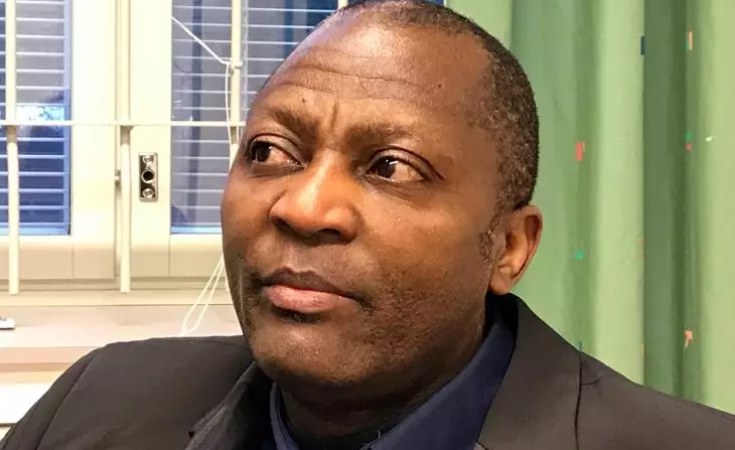"I can never forget that name Gabriel Massaquoi until I die," said "Civilian 43."
At Thursday's appeal hearings for Gibril Massaquoi, the commander of Sierra Leone's Revolutionary United Front, (RUF) standing trial for alleged war crimes and crimes against humanity during Liberia's first civil war, all three prosecution witnesses, who came from Lofa County, Liberia's northwestern region provided harrowing testimonies, claiming he and his soldiers killed residents in a town called Kamatahum.
At the heart of the trial, prosecution witnesses told the Tampere District Court, which acquitted Mr Massaquoi because prosecutors did not prove his alleged crimes "beyond a reasonable doubt" that he set fire to houses and burnt people, including men, women, and children alive, or directed his soldiers to do so-- allegations also corroborated by Thursday's witnesses.
"I can never forget that name Gabriel Massaquoi until I die," said "Civilian 43." "Because he damaged my entire life. It was his group that came to our town. They captured us and killed my mother and my father, then put us on a long rope and tied our hands to each other."
She said that day in Kiatahum (where they were arrested and taken Kamatahum), Mr Massaquoi and his troops lined them up in circles, with Mr Massaquoi introducing himself in a fierce tone. Civilian 43 said since that day, his name has stuck into her head, especially so because of what he allegedly did to her parents when she was a child.
Civilian 43 said Mr Massaquoi also called his infamous name to them.
"He said 'I am Gibril Massaquoi, I am next to God."
Like Civilian 43, many prosecution witnesses have claimed Mr Massaquoi disclosed the name to them before he could allegedly kill civilians or fellow soldiers or order their killings. The name has become a key part of these appeal headings.
She said the chances of anyone surviving when he had given an order was almost impossible.
Most of the victims were innocent civilians who committed no crimes, she claimed.
Mr Massaquoi, who has denied the allegations has been following the hearings from the district court by a video link. He moved there in 2008 as part of an asylum agreement with the UN then backed-Special Court for Sierra Leone, where he served as a "protected witness" in the war crimes trial of former Charles Taylor, a former Liberian President. His testimony was said to be key to the convictions of Mr Taylor and other former RUF commanders.
But Civitas Maxima, a Swiss-based justice organisation working in collaboration with the Global Justice and Research Project, its Liberian partner, presented to the Finnish Attorney General's office what they claimed was evidence of his alleged crimes in Liberia.
They accused him of violating "safe house rules" of the special court and coming to Liberia to commit the crimes, including aggravated rape and aggravated murder, charges he was acquitted of.
"The RUF soldiers used to be hunting for us," said "Civilian 36." "They used to climb up in the palm tree and anywhere they saw smoke they will come there and capture everyone."
"Civilian 50," corroborated the testimonies of the witnesses before him.
He broke down in tears, while talking about his experience of the war to the three-judge panel.
"Every time you call us here to come and talk is like, you have a sore (wound)," said Civilian 50. "And someone takes a stick and pushes it into that sore."
He claimed on the day he and other citizens were taken to Kamatahum as captives by Mr Massaquoi's soldiers, he was the only one who survived that massacre because they realised that he could read and write, so they took him out of the line to be their secretary.
"One by one, all of us who were captured from Kiatahum, they put everyone in the house. That was how I was not among those that they burnt in that house."
Civilian 50 claimed he watched the house going up in flames. Cries of the captives went out aloud, but they were all burnt to death, he told the court.
He claimed it was in Katamahum that he met Mr Massaquoi for the first time.
On 13 April, 2001, Civilian 50 said he had gone to bury his son when Mr Taylor's fighters mixed with RUF rebels attacked their village and took them into captivity, killings dozens of civilians in Kamatahum.
As Thursday's proceedings came to a close, defence lawyers became tougher on Civilian 50 for claiming he could list the people who allegedly died in the Kamatahum house fire massacre by Mr Massaquoi and his solders when he didn't do so during his testimony to the district court.
But in defence of the witnesses, Matias Loneen, one of the prosecutors told Frontpage Africa/New Narratives that hearing the witnesses for the second time gives them a clearer picture of the alleged accounts of situations of the war.
"I can say that we find the situation perhaps clearer this time than the last time because we are being able to put the questions in the right way," said Lonnen.
The hearings continue on Friday.
This story was a collaboration with New Narratives as part of its West African Justice Reporting Project.


